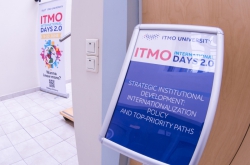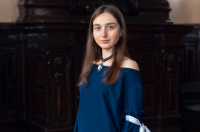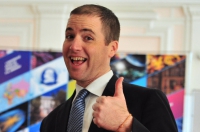Already for a couple of years there have been two double degree programs in the Department of IT in the Fuel and Energy Industry, “Molecular Nano and Biotechnology” and “Organic Materials in Laser Technics” (link is in Russian). These programs have been established by Professor Igor Denisyuk. The first year of the program students study at ITMO University, and for the second year there is a possibility for the most successful students to go abroad. The partner universities of these programs are the New Mexico Highlands University in USA and the Ecole Normale Superieure de Cachan in France. In the end of the program students can defend their master’s theses in both universities they studied in. Finally, they will get two diplomas at once.
“Both double degree programs where established in the context of the 5-100 project” shares Professor Igor Denisyuk, doctor of physical and mathematical sciences. “These programs are the result of many years of diverse cooperation with Professor Isabelle Ledoux-Rak, the director of LPQM laboratory of ESN de Cachan, and Professor Tatiana Timofeyeva from New Mexico Highlands University, both famous scientists and co-leaders of the international laboratory of non-linear optical molecular crystals. The programs started in 2014 and since then already five students from ITMO achieved two diplomas after studies in France. We have also been present with the attestation commission from ITMO in all the theses defenses via Skype.”

To finance the studies abroad, students can apply online for grants offered by the partner universities. This year four students received the financial support for studying abroad after sending their applications with the help of Igor Denisyuk. Three students of the program “Organic Materials in Laser Technics”, Evgeniy Oskolkov, Georgii Bogdanov and Sergey Rigin won a grant of 15,000 dollars per year and are leaving for the New Mexico Highlands University in USA in September. Anastasia Strusevitch, student of the program “Molecular Nano and Biotechnology”, received financial support of 1000 euros per month for one year to study in ESN de Cachan in France.
These students shared their thoughts and experiences on ITMO.NEWS about the double degree programs, applying for the grants from partner universities and advantages of studying in France or the USA for those who are so far only thinking about going abroad.
Why did you choose this program for your studies, and how did you find information when choosing a university for studies abroad?
Anastasia Strusevitch (going to ESN de Cachan, France): For the program I chose you don’t need to know French, as the program will be entirely in English. I think my English skills are good enough for living and studying abroad. This was one of the main factors that affected my choice. The second factor was the possibility to receive a grant from the French side. The financial support of 1000 euros per month gives the chance to not worry about surviving money-wise.

Georgiy Bogdanov (going to New Mexico Highlands University, USA): I got to know about the double degree program when it was already established. That was around three years ago when I was working in ITMO. Already back then I thought that I would apply for the program as soon as I became a Master’s student. Everything about the program was very clear from the very beginning, how to apply for the grant, how it will be distributed and how much will be left for me to spend when getting to the US. This was the main reason for me to choose the program.
Evgeniy Oskolkov (going to New Mexico Highlands University, USA): To me it seems that the USA is the most popular country for education in our field. I didn’t hear of many universities in Paris that would be actively studying the topic we are interested in, except for the one where Anastasia is going. In the USA there are more possibilities and opportunities.
What are the steps you need to go through when applying for the grant? How much time did you spend formulating the documents?
Anastasia Strusevitch: Our department gave us all the information needed well in time. My supervisor was carefully looking after the process and made sure I wouldn’t miss any deadlines.
The first requirements for starting the process are good study results and not having any incomplete assessments. Also you need to show that you are responsible and interested, and be able to sell yourself in order to get a good recommendation letter from your teachers. If a student wants to go abroad but doesn’t meet the minimal criteria, it is intuitively clear that the teachers will not support him.

About the practical steps, first of all you need to collect all the documents. The documents required include your diploma with an official translation and a portfolio with your achievements and publications if there are some. Publications about presentations in conferences can be a good bonus for those who want to study abroad. The other documents needed were passport, your thesis abstract, motivation letter and the application forms. All in all, information about the programs is available all year long, so you can take a look. For me the whole application process took about two months. The deadline was 5th of May, and in the end of June I found out that I was chosen for the program and to receive the grant.
Georgiy Bogdanov: We collected a separate package of documents for the grant. In our case it was the translation of our diploma, which we did with the help of the international office of our university, list of received grades, CV, list of publications, certificate of the knowledge of English which in my case was TOEFL, but for example Evgeniy did IELTS instead. On top of that we sent recommendation letters. Two of them is enough, but you can also collect more of them, I had four. And finally there is the motivation letter. We sent scanned versions of all the documents by mail, but also the paper versions by a courier service. First our university sent a recommendation letter, and then we were in direct contact with the partner university. Right now, we can still contact their assistant if we have any further questions.
Evgeniy Oskolkov: The documents that confirmed that we can study next year in the partner university arrived already in the beginning of June. Judging by the fact that we sent the paper versions of our applications only in mid May, everything worked really effectively.
How will the process of research work be like in the partner university? Will you be able to continue with the research you have been doing in ITMO?

Anastasia Strusevitch: Yes, in ESN de Cachan they have a similar specialty. My advisor told me that I can continue my work in France. They have all the equipment that is required for my research. That is great, because I already spent a lot of time on it. My research is connected to photonic technology. I am working on a synthesis of non-linear optical crystals of an organic salt that is called DAST. In the research I try to find out the non-linear optical properties of a composite that consists of a polymer and DAST nanocrystals. Such a composite due to its properties and the ability to create 2D and 3D structures in its volume can be used in laser technology and photonics.
Polymers are an actively developing topic right now. Scientists around the world are making new findings about their properties all the time. It seems to be a field of the future. I would like to continue working on this topic in France.
Georgiy Bogdanov: Right now I am working on a topic connected to ecology. I’m studying modification of polymers, which is a necessary process for their further use. I am interested in developing my skills in this topic, as well as conducting research connected to biology and medicine. In the New Mexico Highlands University there are possibilities for development in this area. I am not very tightly attached to a single project, on the contrary, I would like to try different projects and broaden my horizons that way.
Evgeniy Oskolkov: My current research is also connected to polymers. More precisely I am studying composition of biomedical polymer materials, including materials for prosthetics for various types of bacteria, several types of heavy metals and so on. As far as I know, there will be a possibility to continue my work, as they have the required laboratories, equipment and specialists.

What kind of possibilities will there be for you to spend your free time?
Anastasia Strusevitch: The possibilities are very similar to ours here. On top of that all the university buildings are in one campus, so there will be no need to commute. In ESN the Cachan there are many sport clubs, and students are free to register anywhere they want. There is one fee for the whole year for joining the club. There are many different kinds of sports, such as basketball, volleyball, swimming and dancing. I do ballroom dancing, and it is important for me to be able to continue my hobby.
Georgiy Bogdanov and Evgeniy Oskolkov: In New Mexico Highlands University the dormitory consists of 8 different buildings. There are rooms for one, two or three people. You pay for the dormitory straight away for the whole semester as well as for the meals. Also it is possible to rent a flat outside the university, and that’s what we decided to do. In the university campus there are sport facilities, a pool, a library and a concert hall that are all free for the students to use. Also they have a special classroom where you can do photo and video montage.
How will it be possible to defend your thesis in two universities at once?
Anastasia Strusevitch: It is possible, and this was also one of the reasons for me to choose the double degree program. First I will defend my thesis in France in the English language. My advisor will come to France to be there at the time of the defense. On top of that, we will have a Skype conversation with the commission from ITMO University. Once I get back, I will have another defense session in Russian this time.
However, I am not planning to stay in France after finishing my studies. Why did I decide to study abroad? I think that for girls with technical specialties it can be difficult to find a job, and that’s why it will be useful to have another diploma from Europe as an asset. On top of that taking part in such a program gives a great opportunity to experience living abroad and to get to know people from different cultures.
Evgeniy Oskolkov: Our situation is a little different. The double degree program with the French partner university takes two years, with two diplomas in the end. Our program with the partner university from the USA takes two years, but we will defend our thesis in Russia and get only the Russian diploma. If we would like to get the American diploma as well, we would have to stay there for another year.
Georgiy Bogdanov: But at the same time we are not obliged to come to Russia for the defense session, everything can be done over Skype. What comes to the American diploma, defending the thesis requires personal presence.
Without a doubt studying in the USA is already a plus in your resume. I would still like to get a degree from a foreign university as well. I believe that it will be useful for my future career, whichever country I choose for getting my degree.




